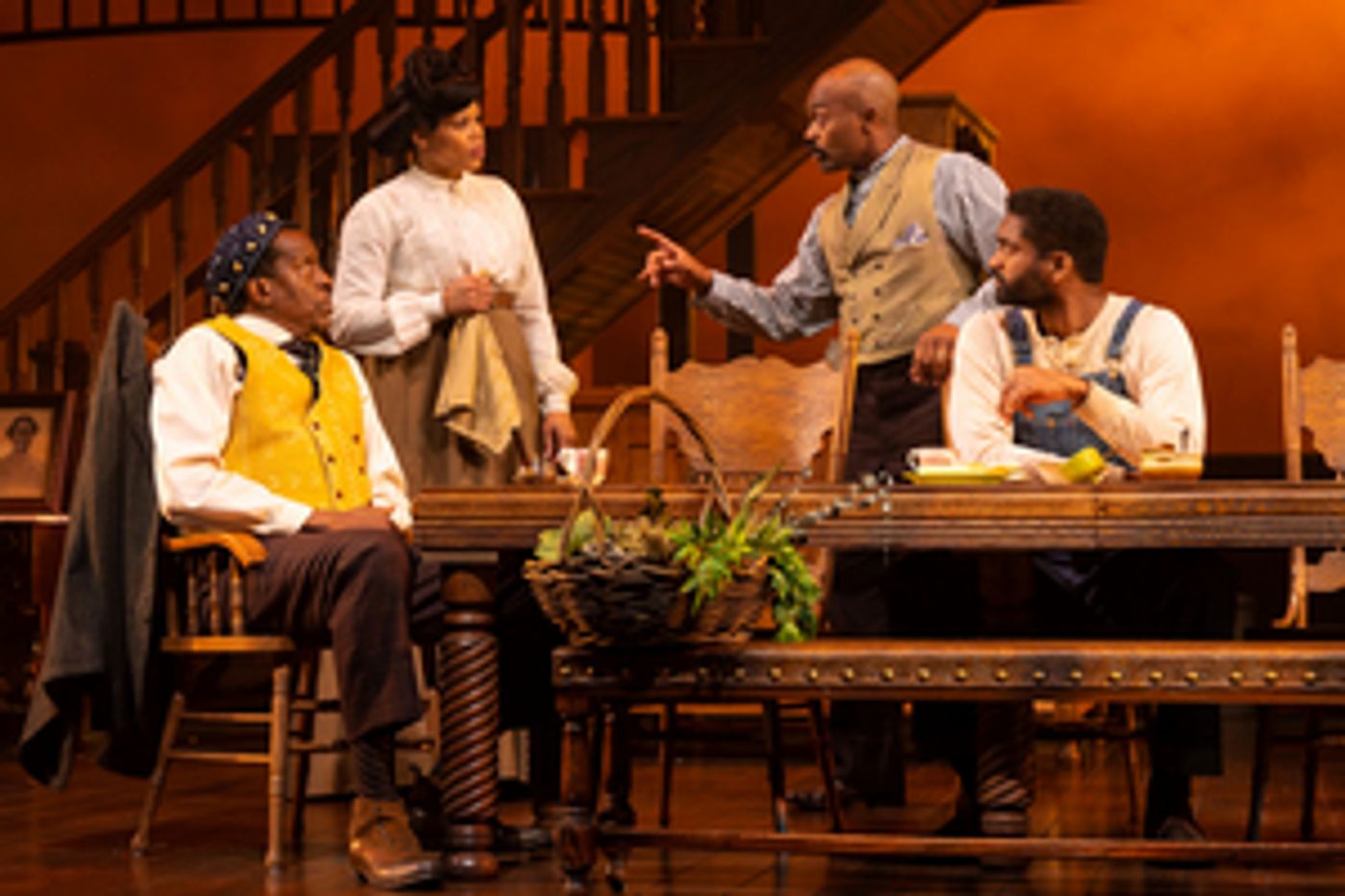Review: AUGUST WILSON'S JOE TURNER'S COME AND GONE
Newly renovated Huntington Theatre reopens after being closed for more than two and a half years for the pandemic and its $55 million transformation project.

REVIEW: August Wilson's JOE TURNER'S COME AND GONE
The newly renovated Huntington Theatre reopens after being closed for more than two and a half years for the pandemic and its $55 million transformation project by celebrating its decades-long collaboration with the late Pulitzer Prize-winning playwright August Wilson. To honor his legacy and the deep connections between the man and the Huntington, the opening night festivities included a ceremony to unveil a plaque dedicating the August Wilson Lobby.
Joe Turner's Come and Gone was the first Wilson play produced at the Huntington in 1986, the beginning of a 19-year relationship that saw all ten of his American Century Cycle plays chronicling the African American experience in the 20th century performed on the local stage. It seems fitting that the Huntington reclaims its place of prominence in the Boston theater community with this rich work whose characters are struggling to find their way during a period of great societal upheaval, proving once again that the arts hold up a mirror to reflect our world.
Set in a boarding house in Pittsburgh's Hill District in 1911, the play introduces us to a group of African Americans who stitch together a community by sharing bed and board, trying to find their place in the cities of the North after having left the farms of the South. Seth and Bertha Holly (Maurice Emmanuel Parent, Shannon Lamb), the hardworking owners, are salt-of-the-earth types who have established themselves in life. Nearly everyone else in the household is searching for something - a job, a companion, their song - and this creates the dramatic conflict for each of them. As new tenants join the table, the threads of their stories are woven together into an intricate, colorful fabric.
Director Lili-Anne Brown finds a way to put each character In Focus at the appropriate time, not an easy task with a cast of this size and diverse natures. Parent and Lamb capture the essence of the caring, caretaker couple, bending but never breaking under the challenges of their position. Robert Cornelius (Bynum Walker) is a big man whose size belies his gentle, spiritual personality. Stewart Evan Smith (Jeremy Furlow) entertains as a young man with a guitar, happy to work, but happier to find a good woman. He will have to choose which of the available female companions is best for him, but Dela Meskienyar (Molly Cunningham) and Al-nis Petty (Mattie Campbell) distinguish themselves in very different ways.
Ancillary characters include Lewis D. Wheeler's Rutherford Selig, an itinerant salesman who provides Seth with materials to craft his wares and make extra money, and a self-described "people finder" who fills a need for so many displaced travelers; Patrese D. McClain showing dignity as one of those needing to be found; and the children (Gray Flaherty, Alana Ross, Eli Lapaix, Joshua McKenna) who alternate in the roles of a neighborhood boy and the daughter of a mysterious boarder, struggling to understand the world around them.
The final cog in the machinery is newcomer Herald Loomis (James Milord), a lost man searching for his lost wife as he tries to put his life back together after 7 years of forced labor for Joe Turner. As detailed and nuanced as are all of the performances, Milord's characterization is especially compelling in service of showing Loomis' gut-wrenching ordeal. In his most visceral scenes, foreboding musical underscoring (Aubrey Dube, sound design) and notable lighting (Jason Lynch) changes enhance the dramatic effect.
Scenic designer Arnel Sancianco's two-story set features a prominent dining area downstage where much of the action takes place, with a staircase leading up to a walkway representing the second floor living area. Samantha C. Jones' costume design employs fabrics, colors, and styles that evoke the era, personality, and economic status of the characters. Hair and Wig design by Earon D. Nealey adds another layer of authenticity.
There is an abundance of things to take away from any live theater experience, and from Joe Turner's Come and Gone in particular, and each audience member will have their own list. However, in light of all that has transpired during the 941 days that the Huntington was dark, the absence of the communal experience, the spiritual, emotional, and mental health challenges we all faced, the dramatization of the value of community and its role in personal redemption represented in this play is the prime takeaway for me.
August Wilson's JOE TURNER'S COME AND GONE
Directed by Lili-Anne Brown; Scenic Design, Arnel Sancianco; Costume Design, Samantha C. Jones; Lighting Design, Jason Lynch; Sound Design, Aubrey Dube; Hair and Wig Design, Earon D. Nealey; Fight Choreographer, Ted Hewlett; Dramaturg, Sandy Alexandre; Production Stage Manager, Emily F. McMullen; Stage Manager, Ashley Pitchford
CAST (in order of appearance): Maurice Emmanuel Parent, Shannon Lamb, Robert Cornelius, Lewis D. Wheeler, Stewart Evan Smith, James Milord, Gray Flaherty, Alana Ross, Bela Meskienyar, Eli Lapaix, Joshua McKenna, Al-nisa Petty, Patrese D. McClain (Understudies: Kadahj Bennett, Kelsey Fonise, David Kelly, Damon Singletary, Melanie Loren)
Performances through November 13, 2022, at The Huntington Theatre, 264 Huntington Avenue, Boston, MA; Box Office 617-266-0800 or huntingtontheatre.org
Photo credit: T. Charles Erickson (Robert Cornelius, Shannon Lamb, Maurice Emmanuel Parent, Stewart Evan Smith)
Reader Reviews
Videos

